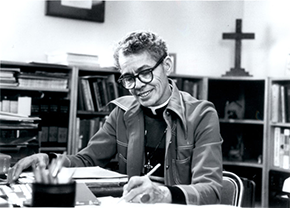Black History Month: Pauli Murray
 Pauli Murray’s exemplary career as a civil rights lawyer began with a seat on a bus in the whites-only section and a subsequent arrest. The experience of being arrested drove her to begin work with the Workers’ Defense League, which propelled her dream of law school, resulting in a law degree from Howard University, a Master’s in Law from the University of California, Berkeley, and the accomplishment of becoming the first African-American to receive a Doctor of Juridical Science degree from Yale Law School. Ruth Bader Ginsberg based her brief on Reed v. Reed on Pauli Murray’s work on gender discrimination, which argued that the Equal Protection Clause should be applied to women under the Fourteenth Amendment. Murray also coined the term, “Jane Crow,” which referred to the adverse impact of Jim Crow laws on African-American women. In addition to her groundbreaking work in gender and racial discrimination, she influenced significant laws related to jury duty and women, protection of black women, and civil rights through her activism and strong education in the law. Murray, along with others, in founded the National Organization for Women (NOW) in 1966, which now encompasses issues that include reproductive rights and LGBTQ rights.
Pauli Murray’s exemplary career as a civil rights lawyer began with a seat on a bus in the whites-only section and a subsequent arrest. The experience of being arrested drove her to begin work with the Workers’ Defense League, which propelled her dream of law school, resulting in a law degree from Howard University, a Master’s in Law from the University of California, Berkeley, and the accomplishment of becoming the first African-American to receive a Doctor of Juridical Science degree from Yale Law School. Ruth Bader Ginsberg based her brief on Reed v. Reed on Pauli Murray’s work on gender discrimination, which argued that the Equal Protection Clause should be applied to women under the Fourteenth Amendment. Murray also coined the term, “Jane Crow,” which referred to the adverse impact of Jim Crow laws on African-American women. In addition to her groundbreaking work in gender and racial discrimination, she influenced significant laws related to jury duty and women, protection of black women, and civil rights through her activism and strong education in the law. Murray, along with others, in founded the National Organization for Women (NOW) in 1966, which now encompasses issues that include reproductive rights and LGBTQ rights.
The different identities Murray held as a queer black woman, whose struggle with gender identity was never publicly discussed (leading to our decision to use female pronouns) has shaped her activism, which was staunchly rooted in dismantling sexism within the Civil Rights Movement, and including women of color in the predominantly-white feminist movement. Her work has paved the way for individuals such as Kimberle Crenshaw to incorporate intersectionality in their work.
She had a career shift later in her life, and became the first African American woman to become an Episcopal priest, and with that, laid the foundation for theology with a womanist framework. In 2012, Murray was initiated into sainthood by the Episcopal Church for her advocacy work for universal freedom, human rights and social justice.
Today, as the reproductive justice movement continues advocating and organizing for marginalized communities, we at RHAP are thankful for Pauli Murray’s significant contributions to feminism and American jurisprudence.
